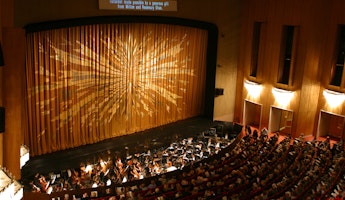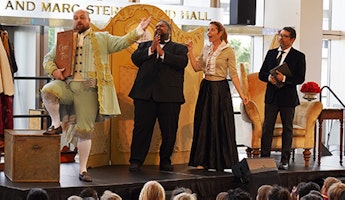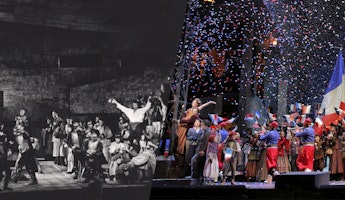Blog
January 15, 2023
Sarah Saturnino on Playing Britten's Lucretia
Can you introduce yourself?
My name is Sarah Saturnino. I am a mezzo-soprano, and I am making my role debut as Lucretia in Benjamin Britten’s The Rape of Lucretia.
Describe your character in your own words.
Lucretia is a woman who is filled with a profound sense of honor, duty and a sweet gentleness. She is waiting for her beloved husband to return from war. For me, her love for her husband is the thing that gets her through the day. He is the reason she gets up in the morning and keeps the house going. There is a great sense of humility and service in her as well. She is what I hope to be as a woman. Strong and smart, feminine and kind, confident and considerate, loving and temperate and fiercely loyal.
One of my favorite moments is after Collatinus has come home and you see her try to be strong for him. You see, even in her absolute horror of what’s happened, that she is striving for dignity. She is trying to be brave as she tells him what’s happened to her. She is an incredibly strong woman!
What challenges are there to singing this role in particular? How have you addressed or overcome them?
I think for me, the most challenging part of this role is the technical pyrotechnics that it requires. Particularly in the aria when you’re constantly switching between the two extremes of your vocal range. That’s one of the things that makes it such a dramatic scene though!
Britten is extremely precise in the way he sets the text. He gives you the dramatic interpretation in every line of music. For example, in Lucretia’s aria, “Give him this orchid,” the vocal extremes really make you feel her frantic pain. You can hear how she’s working through all the stages of grief and trauma, trying to make sense of what happened to her the night before. It’s all on the page for you.
It’s also one of the most challenging scenes I’ve ever done. You must allow yourself to go to that place emotionally, to tell the story, but you can’t allow those feelings to sweep you away. There is a delicate balance of feeling and technique.
I am so grateful for all the amazing coaches and teachers here at LA Opera who have helped me to prepare for this role. Opera is never a one-person sport. You really need a team of people to help you succeed.
What has it been like to work with Resident Conductor Lina González-Granados and your fellow young artists on this project? Any fun memories in rehearsals you can share?
Maestro Lina is incredible. She is one of the most intuitive and discerning conductors I’ve ever worked with. She has an incredible artistry that helps to bring the best out in a singer. You just want to do well for her. She is also very in tune with the singers and what they need. She is incredibly generous with her artistry and intelligence.
When she was conducting Lucia di Lammermoor earlier this season, it was so exciting to watch her! I remember seeing how encapsulated she was in the music and how she really was there for the singers through all the incredibly difficult passages. I really can’t express how thrilled I am to get to work with her on this project.
This young artist class is extremely talented. Some are old friends from previous projects and some of them are in our first big piece together. Everyone has really dug deep into this opera, and it shows. It’s an incredible cast!
We always have such a great time in rehearsals. There are smiles all around – sometime there's even some dancing! I think opera singers can turn anything into a dance party. Who knew Tarquinius’ ride to Rome was such a bop?
What are you looking forward to the most about this role?
I think I am mostly looking forward to telling the story. I think it’s a very important story to tell. I connect very deeply with this character. Not necessarily in the same way that she experiences trauma, but in the way that she loves her husband, her family, her honor. I connect to her bravery. She is an extremely dignified person. It’s a privilege to give her a voice.
What do you hope the audience feels or takes away at the end of the performance?
I hope that it starts a conversation. There are so many horrible things in this world and the subject matter of this opera is one of them, but I hope that’s not the only thing that people dwell on. I hope that they see the love story here. The true love. The selfless love. The love of a cherished husband and an honored wife.
I hope that the audience understands that while this is a very hard opera to watch, this is also an important discussion. What does real love look like to you? Is it selfless? Do you have someone else’s interest at heart or are you acting out of selfishness and envy?
I think this opera helps you to examine your own conscience. Shows you areas that you can be better. That’s what Britten is doing. He is calling us, begging us to be better.
Anything else you’d like to add?
Yes, I’d like to take a moment to thank everyone who has supported me over the years. I couldn’t have made it to where I am today without an incredible team of family, friends, and teachers. When I said opera is a team sport, I meant it!
And I hope that people enjoy the show. It’s a truly beautiful piece. I’m so excited to sing it.
Down with the Etruscans!








/03-cosi/_dsc0996_pr.jpg?format=auto&fit=crop&w=345&h=200&auto=format)















